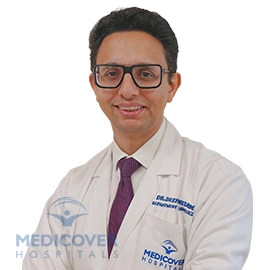Best Hip Dysplasia Doctors in India

- Exp:6+ Yrs

Joint Replacement and Arthroscopy Bengaluru
- Exp:13+ Yrs


and Joint Replacement Surgeon
Arthroscopic Surgeon
Specialist for Pelvis Fracture Surgeries and Rheumatoid Arthritis Cases. Aurangabad
- Exp:8+ Yrs

Sports Medicine Specialist navi-mumbai
- Exp:8+ Yrs

Specialist In Joint Replacement & Trauma Kurnool
- Exp:9+ Yrs




and Joint Replacement & Arthroscopy surgeon. Vizag
- Exp:15+ Yrs

Director of Orthopedic Disciplines navi-mumbai
- Exp:12+ Yrs

Deformity Correction & Pediatric Orthopedic Surgeon navi-mumbai
- Exp:9+ Yrs

Joint Replacement Arthroscopy and sports medicine surgeon Pune
- Exp:13+ Yrs


- Exp:6+ Yrs

- Exp:4+ Yrs

- Exp:8+ Yrs

Joint replacement and Spine Surgeon Vizag
- Exp:6+ Yrs
Importance of Hip Dysplasia Specialist in Treatment
Hip dysplasia occurs when the hip joint is misaligned, causing pain and limited mobility, especially in infants. Early diagnosis is essential to prevent complications like arthritis. Treatment includes bracing for infants and surgical correction for severe cases. Early intervention ensures proper joint development and reduces long-term complications.Why to Choose Hip Dysplasia Specialists at Medicover Hospitals in India
Medicover Hospital offers pediatric orthopedic specialists who treat hip dysplasia. Treatments include bracing for infants and surgical correction for older children or adults to improve hip alignment and prevent future joint issues.
Frequently Asked Questions
What are some common symptoms of Hip Dysplasia in its initial stages?
Early signs of Hip Dysplasia include hip joint instability, limited range of motion, pain in the groin or hip area, and a noticeable size difference between the legs. Seek medical evaluation promptly if experiencing these symptoms.
How can Hip Dysplasia be managed effectively to prevent severe complications?
Effective management of Hip Dysplasia involves early diagnosis, physical therapy, weight management, and sometimes surgery. Regular monitoring and adherence to treatment plans can prevent complications in Hip Dysplasia patients.
What are the co-existing conditions commonly associated with Hip Dysplasia?
Common co-existing conditions associated with Hip Dysplasia include osteoarthritis, labral tears, femoroacetabular impingement, and hip dysplasia-related hip pain. Proper diagnosis and management are crucial for patients with Hip Dysplasia.
How do specialists usually treat Hip Dysplasia?
Specialists typically treat Hip Dysplasia through a combination of non-surgical methods like physical therapy, bracing, and medication, or surgical interventions such as hip arthroscopy or osteotomy to improve joint function and reduce pain.




























